Статьи. Рубрика в журнале - Schole. Философское антиковедение и классическая традиция
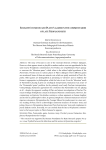
Socrates’ humour and Plato’s games in the commentaries of late Neoplatonists
Статья научная
The irony of Socrates is one of the essential elements of Plato’s dialogues. However, what appears ironic or playful to modern readers, was not apprehended in the same way by Neoplatonic commentators. For Proclus, one of problematic Plato’s passages concerns the “laborious game,” which refers to the refined eight hypotheses of the Parmenides. Proclus turns to various places of Plato’s dialogues where different games are mentioned. Some of them are mimetic arts, which are partly restricted in Plato’s Republic. Other games are distinguished as pertaining to “old men” and to children: the former is appropriate to philosophers, while the latter is not. Even the “laborious” mode of Parmenides’ playing is given an ontological interpretation. Damascius was aware of the “Parmenides’ game” problem, but he primarily used ready Proclean interpretation. Unsurprisingly, Damascius approaches the conclusion that Parmenides was not playing at all — despite the apparent wording of Plato and minute investigations of Proclus. The extant writings of Simplicius contain no dedicated Platonic commentaries. However, the commentary on Epictetus’ Enchiridion contains a verbose argument on human laughter and its role in a philosopher’s ethos. In general, Simplicius continues Damascius’ trend of rigorous seriousness. Olympiodorus the Younger follows his predecessors in a mere serious reading of Plato, but he acknowledges numerous instances of Socrates’ irony and joking. However, Olympiodorus dissociates Plato from Socrates’ irony and emphasises its purely didactic extent. Generally, we can conclude that the later a Neoplatonic commentator is, the less perceptive to Plato’s humour he appears.
Бесплатно

Статья научная
The paper presents the philosophy of God in the philosophical writings of Apuleius of Madauros, one of the most outstanding philosophers of the Middle Platonism of the 2nd century after Chr. A special feature of the theology of the Middle Platonism and what clearly distinguished this philosophy from Stoicism, which was still dominant at that time, with its vision of divinity immanent in the world, was the return to the Platonic concept of the “incorporeal” and “transcendent” God – the Creator and Saviour of this world. This concept of God fit very closely into the mystical spirituality of Middle Platonism. The attribute of God as the Saviour (Sospitator) of the world is particularly important. This is especially visible in the writings of Apuleius. Apuleius uses the term “the Saviour” in the religious sense. This term expresses the religious aspect of God’s activity in relation to His creatures and supplements His metaphysical function as an efficient cause. Apuleius’ theology quite clearly shows its rootedness in the philosophy and mystical spirituality of Plato himself, and at the same time close to the mystical spirituality of the religious Mysteries popular then. It is a very important element of his philosophical spirituality. The awareness of the existence of God, the Creator, Father, and Saviour of the world, clearly influenced Apuleius’ ethics and his perception of man.
Бесплатно
Sources of fragments by the iconoclastic patriarch John Grammaticus (837-843): Leontius of Byzantium
Статья научная
This article analyzes two fragments by the last Iconoclastic Patriarch John Grammaticus (837-843). A number of parallels to the doctrine in the fragments have been identified, including Aristotle, Theodoret of Cyrrhus, Basil of Caesarea, and John Philoponus. It is proposed that the main source of the fragments was a passage from the Epilyseis or Solutions Proposed to the Arguments of Severus by Leontius of Byzantium.
Бесплатно
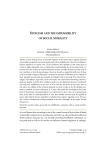
Stoicism and the impossibility of social morality
Статья научная
Stoic ethical theory is famously “rigorist” in the sense that it regards all kinds of generally recognized non-moral goods and evils as “indifferents” that do not influence human happiness or misery. One of the problems with rigorism is that prima facie it seems to make impossible even a rudimentary social morality, for if non-moral evils, experienced by the victims of various inhumane actions, actually do them no harm and do not contribute to their being unhappy, then why should we regard the infliction of these evils as morally wrong? In this paper I examine the question of whether such a critique of Stoic rigorism (put forward, for example, by Claudia Card in her book “The Atrocity Paradigm”) is justified. I argue that, on the one hand, one cannot find convincing counterarguments against it within Stoic tradition itself (e.g, the distinction between “preferred” and “rejected” indifferents, in my view, is of no avail for the Stoics in this case), but, on the other, the validity of this criticism depends on what we take to be the ultimate normative standard of moral evaluation. It is only valid under the assumption that some kind of “humanistic consequentialism” (as I call it here) is true. I also try to demonstrate that, if this kind of consequentialism is true, then similar criticism may be applied to many other ethical theories regardless of whether they endorse rigorism or not. (Personally, I believe “humanistic consequentialism” to be true, although I do not argue for this thesis here).
Бесплатно
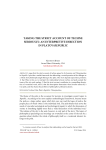
Taking the strict account of techne seriously: an interpretive direction in Plato’s "Republic"
Статья научная
I argue that the strict account of techne agreed to by Socrates and Thrasymachus in Republic I provides a useful framework for addressing a central question of the dialogue as a whole: how philosophy might belong to the polis. This view depends upon three positions: 1) that Plato invites us to interpret the relationship between techne and polis outside the terms of the city-soul analogy, 2) that the strict account contributes to a compelling description of vocational work, and 3) that this description determines what Socrates means by a true polis, and thus frames the problem of philosophy’s political inclusion.
Бесплатно
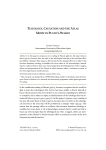
Teleology, causation and the atlas motif in Plato's Phaedo
Статья научная
In this paper, I propose a new reading of Phaedo 99b6-d2. My main thesis is that in 99c6-9, Socrates does not refer to the teleological aitia but to the aitia that will be provided by a stronger ‘Atlas’ (99c4-5). This means that the passage offers no evidence that Socrates abandons teleology or modifies his views about it. He acknowledges, instead, that he could not find or learn any aitia stronger than the teleological one. This, I suggest, allows an interpretation of the Phaedo in which Socrates offers a consistent account of the aitia of generation and destruction.
Бесплатно
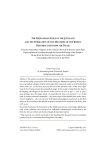
Статья научная
The author reveals the following sequence in the formation of the Jewish doctrine of the bodily resurrection of the dead: during the Babylonian captivity of the Judaeans, a naturalistic allegory of their revival upon their expected return to their Motherland arises (Ezek. 37:1-14, Isa. 26:19, 41:14); by the end of the period of exile / at the very beginning of the Persian period, the personified image of the people’s rising from the dead is developing (the allegory of the Servant of the Lord in Isa. 42:1-9, 49: 1-7, 50:4-9, 52:13-53:12; perhaps also the image of Job, cf. especially: Job 19:25-27a and 42:5, 7-17). In the time of another national catastrophe - the persecution of the faithful Jews under Antiochus IV Epiphanes - the concept of an individual eschatological resurrection in the flesh arises; at this receiving of the afterlife requital is assumed to be realized in the body (Dan. 12:1b-3, 13).
Бесплатно
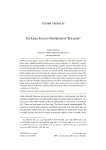
The Early Stoa on Two Kinds of “Pleasure”
Статья научная
In this paper, I want to offer a detailed justification of the thesis that the early Stoics made a significant distinction between two types of hedone (i.e. “pleasure”), namely, physical pleasure and pleasurable emotion, despite using the same term for both. To this end, I first summarize the arguments in favour of this thesis that have already been presented in scholarly literature: emotion is a mental activity, while physical pleasure is one of the possible objects of this activity; the opposite of pleasure as an emotion is lype (“distress”), whereas the opposite of physical pleasure is ponos (“pain”); emotion is a moral evil, whereas physical pleasure is an indifferent. I then offer further arguments to demonstrate that, in early Stoic thought, physical pleasure should be understood as a bodily affection rather than a mental activity. Finally, I analyze and criticize the views of those scholars who argue that the early Stoics regarded physical pleasure either as a mental activity or as a component of emotion.
Бесплатно
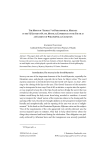
Статья научная
The paper deals with the topic of secrecy of the philosophical message in the VII Letter of Plato. The theme suggests spiritual contexts close to the Greek Mysteries, because the secrecy was one of the key elements of Greek Mysteries, especially Eleusinian and Orphic ones, which played a special role in the formation of Greek philosophy.
Бесплатно
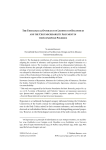
Статья научная
The theological contribution of Leontius of Byzantium played a crucial role in adapting the notions of substance and hypostasis from their original Trinitarian to a Christological context. The Leontian concepts, such as enhypostasized substance, distinction between the principle of substance and mode of existence, as well as “relational” ontology of reversed unions and distinctions at the levels of substances and hypostases was adopted by Maximus the Confessor and John of Damascus in their polemical application of Neo-Chalcedonian Christology, as well as the by the Iconophiles of the Second Iconoclasm in support of the circumscribability of Christ.
Бесплатно
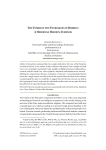
The Tombs of the Patriarchs in Hebron: A Herodian Heroon-Temenos
Статья научная
Researchers estimated that the complex built above the Cave of the Patriarchs was built by Herod. A new carbon-14 date reinforces this opinion. The complex was built over a cave, seemingly a natural karst void, possibly modified by humans, traditionally associated with the burial Cave, where Judaism's Patriarchs and Matriarchs are interred - defining the compound as a Heroon, enclosed by a "temenos". A concealed burial loculus meant for a single ossuary was discovered in the system below the floor of the temenos. Considering all the data, we would like to suggest that the Heroon-temenos was built at the beginning of Herod's reign and the individual burial loculus was set apart for Herod himself before he opted for burial in Herodium.
Бесплатно
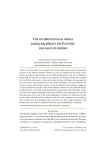
The anthropological model in the Platonic dialogue Charmides
Статья научная
In this study we investigate the extract 154b8-156c9 from the introductory chapters of the Platonic dialogue Charmides so that to examine how the terms of Aesthetics are formed, which focuses on the selfhood and makes it the core of dialectics. Specifically, we structure our study in two chapters each of which includes two subchapters. In the first subchapter we focus on the soul, which in the Platonic text appears to be the criterion for moral perfectness. In the second subchapter, which systematizes the former, we show how Socrates contrives to do the transition from subjective judgments to logical propositions and the terms of the authentic Aesthetics. In the third subchapter, paying attention to the first communication between Socrates and Charmides, we discuss how the Athenian philosopher sets beauty within its true boundaries and activates the logical part of the soul. In the fourth subchapter, we follow the introduction in dialectics, which will lead anyone involved in truth. The main contribution of our study is that we show how in this dialogue Plato succeeds to go from vulgar hedonism to the beauty of the soul, which is a requirement for the inner transformation of selfhood.
Бесплатно
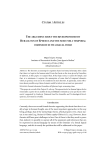
Статья научная
The theories accounting for cognition based on formal schemata often claim that there is a logic in the human mind. From the thesis on the river given by Heraclitus of Ephesus, in this paper, it is argued that, if that logic exists, it cannot be simple, and that, at a minimum, it requires the assumption of some kind of temporal elements, which, in general, seem not to be considered in such theories. In particular, some reflections about possible ways those elements could be taken into account are presented.
Бесплатно
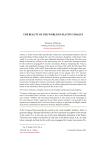
The beauty of the world in Plato’s "Timaeus"
Статья научная
In the Timaeus Plato describes the world as the ‘most beautiful’ ( kallistos, 29a5) of generated things. Perhaps indeed this is the first systematic description of the beauty of the world. It is, at any rate, one of the most influential statements of the theme. The Stoics were deeply convinced by it and later, in the third century A.D., at a time when contempt and hate for the world were propagated by Gnostic movements, Plotinus, interpreting the Timaeus, would write magnificent passages on the beauty and value of the world. But what does Plato mean by the ‘beauty’ of the world? What makes the world beautiful? In this paper these questions are approached first (1) by a brief discussion of the distinction which Plato appears to make in the Timaeus between beauty and the good. In one passage ( Tim. 87c) ‘measure’ seems to relate to this distinction. It is suitable then (2) to look at a section of another late work of Plato, the Philebus, where the themes of beauty, goodness and measure may be compared in more detail. The theme of measure then takes us back (3) to the Timaeus, in order to examine the role played by measure, in particular mathematical measure, in constituting the beauty of the world. I discuss in detail the way in which mathematical structures make for the beauty of soul and body in the living whole that is the world.
Бесплатно
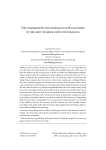
The cosmography and cosmology of Wang Chong in the light of Greek and Latin parallels
Статья научная
In his extensive work, the Lunheng Wang Chong (27–ca. 102) repeatedly criticizes the views of certain literati. We consider the possibility that some of the views of both the literati and the critic go back to Greek scientific and philosophical traditions. Various statements in the Lunheng have clear analogies in Greek and Latin texts. For instance, to illustrate the contrary motion of the sun and moon relative to the fixed stars Wang Chong compares their movement to that of ants crawling on a rolling mill-stone. The same comparison appears in Vitruvius and a number of Greek writers. There was an early Greek theory of Air that knows everything everywhere; Wang Chong cites precisely the same idea in respect to qi, barely distinguishable from air in the context. Wang Chong knows the extravagant Chinese theory that involves seasonal rise and fall of the sun attached to heaven. However, if the sun is not attached to heaven the corresponding theory turns ingenious. Precisely such a version of the theory is attested for Anaximenes whose views display many links with the views that circulated in China. Moreover, Wang Chong holds the same basic cosmographic views as Anaximenes. Wang Chong has a correct idea of the distance between the observer and the horizon, but this normally requires knowledge of the radius of the spherical earth, which suggests the Greek origin of the numerical data available to Wang Chong.
Бесплатно
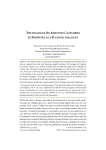
The dialogue on Aristotle categories by porphyry as a platonic dialogue
Статья научная
The paper focuses on interactive dialogue-form strategies in the framework of the late antique Greek and early Byzantine logical traditions. The dialogue by Porphyry On Aristotle Categories is a perfect example of the Neoplatonic approach to build logic in a Plato style. The main protagonistresses of the dialogue are The Question and The Answer, who act as collocutors do in traditional Platonic dialogues. It is proposed to consider the dialogue in the context of three perspectives: in accordance with the tradition of the Platonic dialogue; in the light of Aristotle's education system; in its relation to the late antique and medieval Greek logical dialogue experiments.
Бесплатно
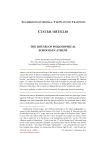
The houses of philosophical schools in Athens
Статья научная
In the first and second parts of the article we look at two archaeological sites excavated in the center of Athens, a building, located on the Southern slope of the Acropolis and now buried under the Dionysiou Areopagitou Street, known as House Chi, or the “House of Proclus”, and Houses A, B and C at the slope of the Areopagus overlooking the Athenian Agora. We outline and illustrate the basic finds and reexamine the principal arguments in favor of identifying these constructions as the houses of philosophical schools and, in the third part of the paper, offer a remark on religious practice in the Neoplatonic school.
Бесплатно
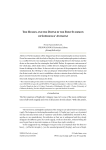
The human and the divine in the first stasimon of Sophocles’ Antigone
Статья научная
The first stasimon of the Antigone has the second antistrophe as its key moment. If read in connection with the whole of the play, the second antistrophe points in advance to a conflict between two inadequate forms of relationship between the human and the divine as the reason for the catastrophe that befalls Thebes. It represents a microcosm of the whole play, which deals with a conflict between Antigone’s and Creon’s inadequate forms of relating to the divine. It does not refer to just one of the protagonists but to both simultaneously. By referring to what an adequate relationship between the human and the divine is and what it is not, it establishes a decisive criterion from which not only the play’s outcome but also the meaning of every human society can be assessed.
Бесплатно
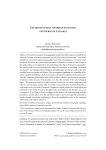
The model of holy sovereign in encomia of Eusebius of Caesarea
Статья научная
The article examines the hagiographic model of a Holy Emperor, formed by Eusebius of Caesarea in his later encomiastic speeches “In Praise of Constantine”, “On Christ’s Sepulchre”, and in the laudatory biographical work “Life of Constantine”. In contrast with the literal, rhetorical and political interpretation of Eusebius’ concept of Holy Emperor, the author takes a new approach to the symbolism of the figure of Emperor Constantine. The article’s task is to reveal and trace the image of Constantine as a working “symbolical mechanism”, associating profound religious and philosophical concepts, such as the relationship between eternity and history. The investigation highlights the originality of Eusebius’ symbolical thinking, which, in contrast to the ancient traditions and customs, provides the Christian-philosophical view of the problem related to preserving the examples of holiness in the memory of descendants. It is this that consists of the tasks of hagiography. The proposed model of a Holy Emperor is based on two main components: the ruler as a sacred image, and the ruler as a subject of sacred history. Eusebius finds the sacred image in the very soul of Emperor Constantine, which reflects the eternal ideas and is likened to the Word of God. In the light of the sacred history, the Basileus acts as an “interpreter” of the Word of God, revealing it in his politics, the understanding of divine providence and his place in it. The Christian emperor opens the logos-like principle in people through his deeds, transferring it from the intelligible realm to the empirical sphere that is the sphere of history.
Бесплатно
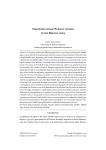
The neoplatonic pursuit of God in the Middle Ages
Статья научная
This paper studies the differing approaches to pursuing God during the Middle Ages to show the latent Neoplatonism inherent to four prominent thinkers from the Early to High Middle Ages. Beginning with Pseudo-Dionysius the Areopagite, God’s darkness is equated with an ineffable light. Pseudo-Dionysius used darkness to describe God exceeding the bounds of the intellect; a metaphor also used to illustrate the non-objectifying imperative for union with God. In union, Pseudo-Dionysius outlines an apophatic process concurrently with a ladder of ascent. Eriugena appropriates Pseudo-Dionysius’ darkness, albeit dialectically. In accepting the limitations of the intellect, Eriugena maps the boundaries of the intellect using binary oppositions between being and non-being and the created and uncreated. Eriugena concludes we can achieve union only by meditating upon God’s theophanies. By distinguishing reason from faith, we observe the turn to reason in Anselm. In signifying the start of the High Middle Ages, Anselm makes the unprecedented claim that God is proveable through reason alone, although such proof requires arduous contemplative work. Anselm nevertheless understood prayer and faith as prerequisites for pursuing God. Anselm’s view of the limitations of the intellect later becomes the backbone of his Ontological Argument, which Aquinas takes up and revises by focusing on Anselm’s definition of contemplation. For Aquinas, the non-objective vision of God, which he calls a beatific vision, is the ground for union with God. The very limitations of the intellect for Aquinas prove the need for beatific vision as the prerequisite for bridging the infinite gap between God and intellect. Throughout this investigation, we uncover the intrinsic Neoplatonism in the Middle Ages philosophers exhibited in their pursuit of God.
Бесплатно

